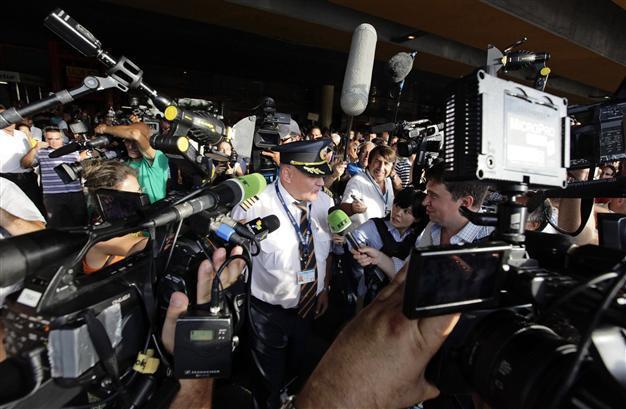Fugitive leaker Snowden ‘wants’ Russia asylum
MOSCOW

Reporters surround a crew member of Aeroflot's Moscow-Havana flight as they ask about former spy agency contractor Edward Snowden's whereabouts, at Havana's Jose Marti International Airport July 11, 2013. REUTERS/Desmond Boylan
USA leaker Edward Snowden wants to seek asylum in Russia, according to a Parliament member who was among about a dozen activists and officials to meet with him July 12 in the Moscow airport where he’s been marooned for weeks.Duma member Vyacheslav Nikonov told reporters of Snowden’s intentions after the meeting behind closed doors in the transit zone of Moscow’s Sheremetyevo airport.
Snowden is believed to have been stuck in the transit zone since June 23, when he arrived on a flight from Hong Kong, where he had gone before his revelations were made public.
He had been expected to transfer in Moscow to a Cuba-bound flight, but did not get on the plane and had not been seen in public since then. Snowden earlier made an initial bid for Russian asylum.
Snowden could stay in Russia if he stops issuing leaks that damage the United States, the Kremlin said July 12, reiterating President Vladimir Putin’s view on the issue.
“Mr. Snowden could hypothetically stay in Russia if he: first, completely stops the activities harming our American partners and U.S.-Russian relations and second, if he asks for this himself,” Putin’s spokesman Dmitry Peskov said in comments quoted by Russian news agencies.
Venezuela, Bolivia and Nicaragua recently have offered him asylum, but it is unclear if he could fly to any of those countries from Moscow without passing through airspace of the United States or its allies.
The activists at the meeting included Sergei Nikitin, head of Amnesty International’s Russia office, and Tatiana Lokshina, deputy head of the Russian office of Human Rights Watch. Also taken into the meeting room were Russia’s presidential human rights ombudsman Vladimir Lukin, prominent attorney Genri Reznik.
‘Promise’ for stopping leaks
According to Reznik, the fugitive “promised that he would not act to harm the United States.”
The meeting came after an e-mail in Snowden’s name was sent July 11. On Facebook, Lokshina posted the text of the email, which says in part that Snowden wants to make “a brief statement and discussion regarding the next steps forward in my situation.” Hundreds of journalists flocked to the airport, but were kept in a hallway outside the meeting area which was behind a gray door marked “staff only.”
The text of the invitation did not directly address the offers of asylum, though it expressed gratitude for asylum offers and says “I hope to travel to each of them.”
It accuses the United States of “an unlawful campaign ... to deny my right to seek and enjoy this asylum.”
How much the human rights organizations could influence a Russian asylum bid or other aspects of Snowden’s dilemma is unclear. Putin takes a dim view of non-governmental organizations’ involvement in political matters.
But an appeal by Snowden to internationally respected groups could boost his status and give Russia a pretext for reconsidering asylum.
Russia has said it cannot extradite him because by remaining in the transit zone he is technically outside Russian territory.
















